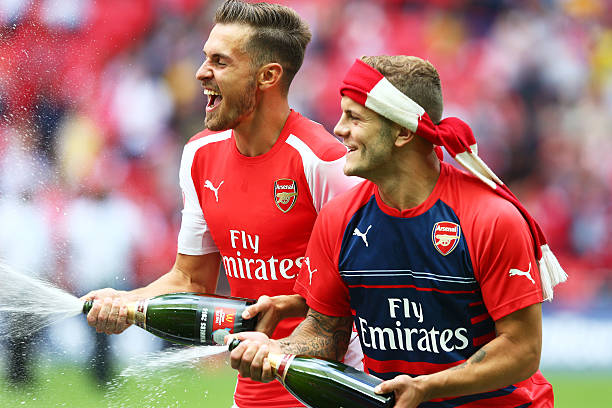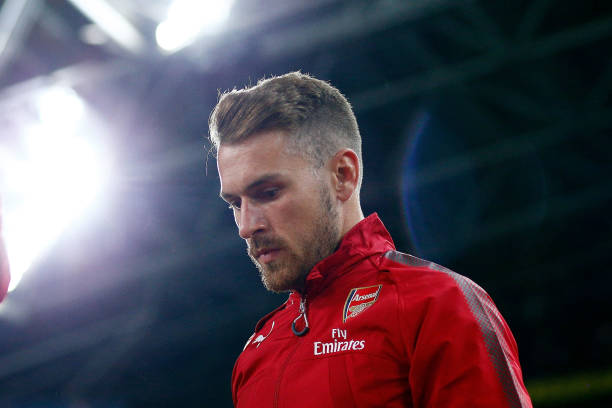This was first written in the summer of 2017. It’s striking how little needed to be changed 18 months later but with the news that Aaron Ramsey will be a Juventus player next season after 11 years at Arsenal, I thought we should look again at why he divided Arsenal fans so much…
It’s almost impossible to discuss Aaron Ramsey without it turning into a blazing argument. Why is that?

Divided we fall
At most football clubs, a player who was the central figure in a club’s most aggressive league title pursuit since 2007/08, ended a nine-year trophy drought with an extra time cup final winner, silenced the noisy neighbours with an impudent backheel in their own backyard, and then scored another winner in a cup final against another city rival you rarely beat, all in the space of four seasons, would be universally adored by the fanbase.
However, this is unequivocally not the case for Aaron Ramsey.
But why is a midfielder, with so many useful qualities, who has given Arsenal fans some of the happiest footballing memories of recent times, such a divisive figure?
Regardless of how old you are or what your interests are outside of football, you will have been party to some unnecessarily binary debates in your time. The Beatles or The Stones, cats or dogs, Biggie or 2pac, Blur or Oasis, Stone Cold or The Rock, Brand New or Taking Back Sunday, Taylor Swift or Carly Rae Jepsen.
Amongst a section of the Arsenal fanbase, one such debate was Aaron Ramsey or Jack Wilshere.

While these debates are naturally occurring between two broadly similar entities which exist in the same space, there is no need for them to be so binary. It’s perfectly fine to like both, to offer a nuanced answer expressing the virtues of one, but then concluding that the other is more your cup of tea.
But that rarely happens.
Instead, what you tend to get is an overcompensating polarised simplification.
Your favourite becomes idealised and put on a pedestal, viewed through rose-coloured glasses. You further expand the gulf between the two by burying the one you don’t like as much, to present a more compelling argument for your favourite being the best by a long way.
We’ve all done this at some point, to varying degrees of severity, at varying degrees of sincerity.
After years of back and forth, and the weight of evidence building in favour of one, the Ramsey or Wilshere debate should have been conclusively settled as one led Wales to the semi-final of Euro 2016 and fired Arsenal to another FA Cup triumph, whilst the other was shipped out on loan to Bournemouth, where he had an unremarkable season.
Yet the anti-Ramsey sentiment remained.
It’s clear that this wasn’t a case of playing favourites any more. This was no longer a Ramsey vs Wilshere debate. It was something bigger, something deeper. One can argue that the debate became Ramsey vs his detractors’ own outdated preconceptions of a player who quite frankly doesn’t exist.
When you deeply believe something and hold it to be true, you may grow increasingly stubborn, not wanting to back down and admit that you may have got it wrong, even in the face of mounting evidence to the contrary. We’ve all been there in some capacity in our lifetime, some more than others.
A lot of Arsenal fans were frustrated by Ramsey’s performances in the 2011/12 season, his first full one after coming back from having his leg broken at Stoke at the end of February 201. They’d forgotten the player he’d shown signs of becoming in his starring performances in the months before his career-threatening injury. They failed to show empathy or patience for a young man looking to rebuild his career following a massive physical and psychological trauma.
With every miscue on the pitch, the groans grew louder, the tweets grew more venomous.
Fast forward

Fast forward to 2018 and the vitriolic tweets and heckles from the crowd remained, even in the face of everything Ramsey has achieved on the pitch since early 2013 when Arsene Wenger restored him to the centre of midfield to form a formidable partnership alongside Mikel Arteta. While his development trajectory since then did not remained linear, there were no significant lows to temper the highest highs, even as he played in a team that wasn’t set up to get the best out of him.
Off the pitch, Ramsey has never spoken ill of the club, manager, or fans.
He never voiced a desire to leave. He’s a family man, who does extensive charity work with animals in his spare time. The only character trait anyone could take issue with is perhaps they may find him a bit beige.
It’s mind-boggling that he can inspire such animosity.
Maybe it’s because some fans perceived Ramsey to be wasteful with the ball, which is a legitimate criticism for which there is tangible evidence. But even in an average game, he takes risks, commits to runs and puts himself in a position where he can make something happen. You miss 100% of the shots you don’t take, as the old adage goes. He’s not a reckless player, his risks are calculated, and in the biggest moments they have come off.
In a match where something comes off, people are happy to overlook all the attempts that don’t. Take the 2014 FA Cup final against Hull, for example. Nobody would care to remember Ramsey’s shots that didn’t go in, they’ll just savour the winner. Speak to Liverpool fans about Steven Gerrard’s performance against West Ham in the 2006 final. They’ll eulogise his last minute equaliser. None of them will mention his countless attempts that didn’t nestle in the back of the net.
Closer to home, Alexis Sanchez was an even more high risk, high reward player who could be frustrating with the regularity of which he lost the ball, despite his goal return. Unlike Ramsey, his body language on the pitch and comments to the media left a lot to be desired. Yet Sanchez’s conduct and output were rarely called into question at all, let alone scrutinised to the extent of Ramsey’s. This suggests that Arsenal fans’ issue with Ramsey is something deeper than just his character or tangible output on the pitch.
All things considered, in February 2019, Ramsey’s biggest detractors are not voicing such vehement views as a rational response to tangible evidence. They are not voicing such views to diminish him in an unnecessarily binary debate against a player who won’t even be at the club next season.
They’re doing so as a preservation of ego.
During the 2016/17 season at the Emirates, had you looked away from the action for a second and heard a theatrical groan from another fan a couple of rows behind, you could almost always guess which player had been responsible for inspiring the performative outburst. Ramsey.
His biggest critics, both on social media and in the ground feel the need to validate their views as a form of confirmation bias, pontificating, forever competing for that one moment of self-aggrandising glory, where they hog the intellectual spotlight and hold dominion.
Some people have an innate desire to want to appear to be the most right. Even when they’re not. They’re too proud to admit they may have misjudged a player, or that circumstances have changed and the player has improved, so they double down on an outdated view that wasn’t fully correct in the first place.
This may not be the most accurate answer as to why Aaron Ramsey remains such a divisive figure amongst a fanbase he has given so much for and provided so much happiness to, but it’s the only one that makes sense when you consider the surreal depth of the vitriol hurled his way.
